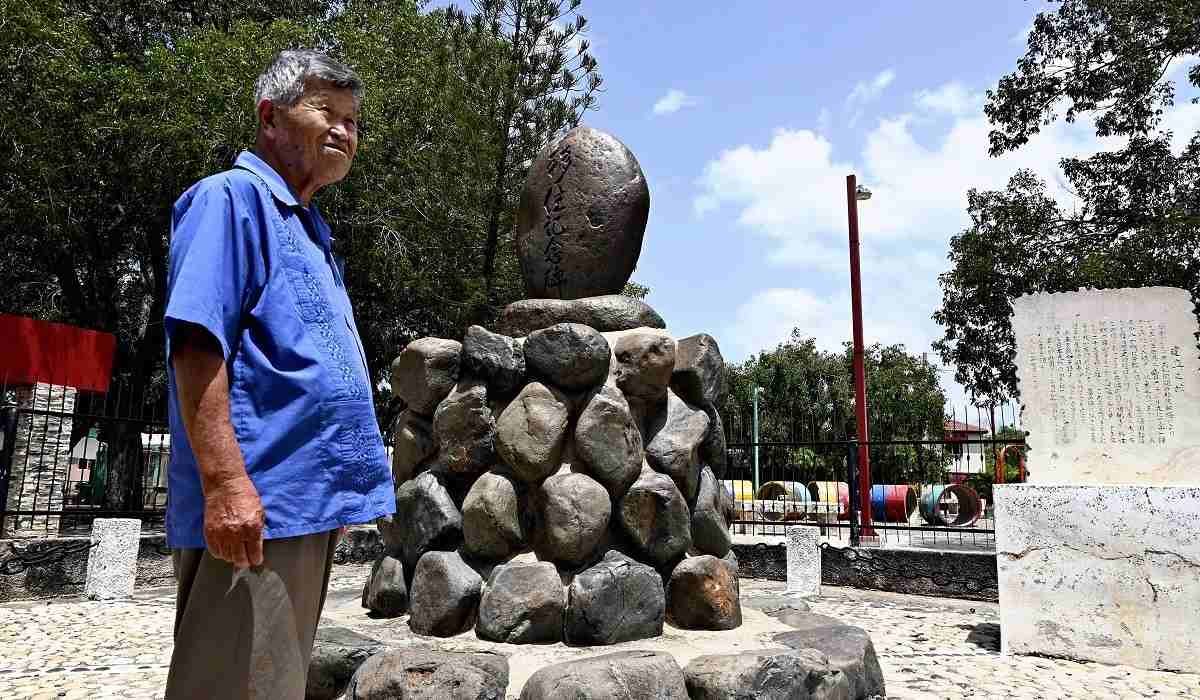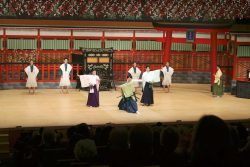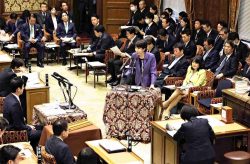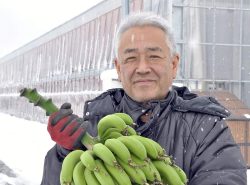
Takashi Mukai, a Japanese immigrant to the Dominican Republic, stands in front of a monument for Japanese immigrants in Dajabon in the country on July 21.
6:00 JST, August 18, 2023
DAJABON, Dominican Republic — Lured by promises of land in a “Caribbean paradise,” Japanese immigrants to the Dominican Republic in the mid-20th century found a life of hardship instead.
Now, 67 years after that migration began, the government of the Dominican Republic has officially acknowledged its responsibility and started paying compensation, following the somewhat earlier example of the Japanese government.
Many Japanese crossed the sea believing the Japanese government’s advertisements about a new life in the country, touted as a Caribbean paradise.
The faces of those who were forced to undergo difficulties for many years revealed the depth of their hardships.
“We are finally satisfied,” said Takashi Mukai, 76, after receiving compensation from the Dominican government.
Mukai, originally from the city of Iwakuni in Yamaguchi Prefecture, immigrated to the Dominican Republic in 1958, when he was 10 years old. Seven members of his family — Mukai, his grandmother, parents and siblings — settled in Aguas Negras in the southern part of the country.
The Japanese government advertised that they would be able to return to Japan in eight years after earning a certain amount of money, and that the Dominican government would purchase their farmland.
Believing what he was told, Mukai’s father sold the family’s house and land in Japan. Mukai crossed the sea with his family, carrying his school textbooks up to junior high school.
Though the country, which shares the island of Hispaniola with Haiti, was portrayed as a Caribbean paradise, the reality was different. The place where they settled was in jungle, with no electricity. There was no tap water, so they had to go to a river to scoop up water.
Months after their arrival, they still had not been given the promised plot of land. So, the family cultivated land about a kilometer from their settlement, planting coffee and corn. With no water for irrigation, the growth of their crops depended on how much it rained — and the plants did not grow well. Struggling financially, the family even sold their clothes to buy rice.
After a while, the family moved to Dajabon, a town near the Haitian border, where an acquaintance lived. The land there supported huge cacti, but it was not fertile enough for farming.
The family obtained less than 10% of the farmland they had been promised. And what they did receive was farming rights, not property rights.
As the eldest son, Mukai was expected to earn money and could not go to school.
“If we had known the reality, we wouldn’t have come here,” Mukai said. “If I had stayed in Japan, I could have gone to school and bought books when I wished.”
Suing Japan
Japanese immigrants to the Dominican Republic settled in eight locations, but they were not given the land stipulated in the application guidelines for immigration. So, they kept on making petitions to the local Japanese Embassy and Nihon Kaigai Kyokai Rengokai, a predecessor of the Japan International Cooperation Agency.
Toru Takegama, the president of the association of Japanese immigrants in the Dominican Republic, remembers that his father was one of them.
In 1987, his father told him on his deathbed: “I regret that we were unable to solve the problem. I’ll leave the rest to you.”
Takegama, now 85, started collecting materials and testimony to find out why the Japanese government promoted migration to the Dominican Republic with false advertisements. However, he found himself ill-treated in Japan, as if he had been “discarded” by his home country.
In 1999, Takegama and others decided to file a damages suit against the Japanese government, which was reluctant to present any settlement plan.
Elderly immigrants signed proxies in tears, lamenting that they had to sue their home country. As some people were against the suit, the Japanese immigrant community became divided.
In June 2006, the Tokyo District Court acknowledged the Japanese government’s responsibility for the first time, but it rejected the claim for compensation. Although the group of immigrants appealed to a higher court, it later dropped the appeal on the condition that the Japanese government would offer an apology.
However, Takegama could not shake the feeling that the Japanese government regarded them as “people who had been discarded” instead of migrants.
In July 2021, the Dominican Republic’s foreign minister offered an apology to Japanese immigrants for the first time on the occasion of a ceremony to mark the 65th anniversary of Japanese migration to the country. In October that year, a presidential decree was issued to facilitate the compensation. However, neither the Dominican nor the Japanese governments made any announcement to the media.
“There was an unspoken agreement to quietly bring an end to the issue,” said a party concerned.
“I’m glad we didn’t give up and kept negotiating,” said Takegama. “Now, I have nothing but words of gratitude for the people in the Dominican Republic.”
Top Articles in Society
-

Producer Behind Pop Group XG Arrested for Cocaine Possession
-

Man Infected with Measles Reportedly Dined at Restaurant in Tokyo Station
-

Man Infected with Measles May Have Come in Contact with Many People in Tokyo, Went to Store, Restaurant Around When Symptoms Emerged
-

Woman with Measles Visited Hospital in Tokyo Multiple Times Before Being Diagnosed with Disease
-

Australian Woman Dies After Mishap on Ski Lift in Nagano Prefecture
JN ACCESS RANKING
-

Producer Behind Pop Group XG Arrested for Cocaine Possession
-

Japan PM Takaichi’s Cabinet Resigns en Masse
-

Man Infected with Measles Reportedly Dined at Restaurant in Tokyo Station
-

Israeli Ambassador to Japan Speaks about Japan’s Role in the Reconstruction of Gaza
-

Videos Plagiarized, Reposted with False Subtitles Claiming ‘Ryukyu Belongs to China’; Anti-China False Information Also Posted in Japan






















